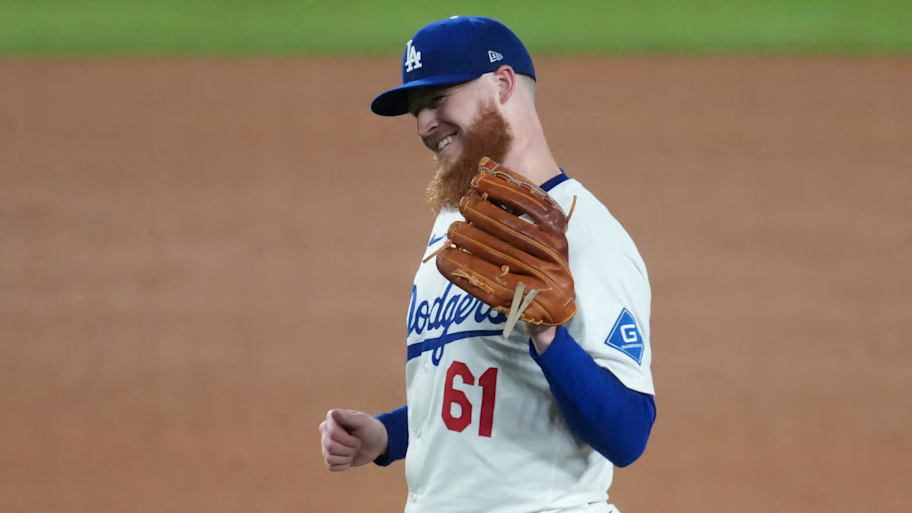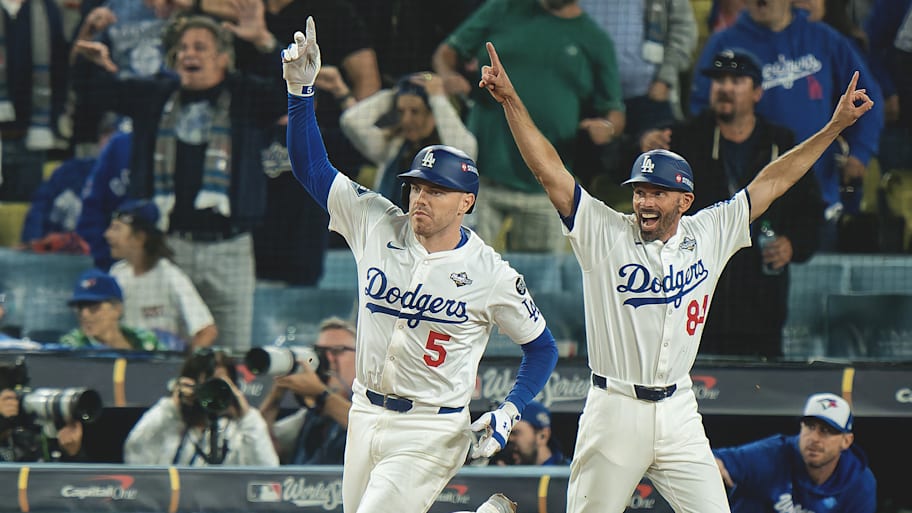LOS ANGELES — In the end, it was star first baseman Freddie Freeman who ended it at 18 innings, when his third consecutive deep drive to center field was finally enough, but when he crossed the plate, the person he was looking for was an anonymous reliever who barely made the roster: Will Klein.
It took 18 innings, six hours and 39 minutes, 45 players, 153 plate appearances and a heroic effort from a pair of maligned bullpens, but finally the Dodgers prevailed 6–5 in Game 3 of the World Series to take a series lead of two games to one.
Seven years after the Dodgers played an 18-inning World Series Game 3 here, this one matched it for longest in Fall Classic history. (Though thanks to the pitch clock, it took 41 minutes less than the 7:20 slog between the Red Sox and the Dodgers.) The Blue Jays used all eight of their relievers; the Dodgers used all nine of theirs. The Blue Jays used every position player.
So many moments in the game were just a win away from being World Series classics. Vladimir Guerrero Jr. scored from first on a single. Shohei Ohtani tied a 119-year-old record for extra base hits in a Fall Classic game. And then there were the wild ones: A late strike call led to a pickoff at first base. Three good defensive plays in the infield nabbed a runner at third base on a single. Ohtani was caught stealing when he fell off second base. A pinch runner was thrown out trying to score on a double. Ohtani was intentionally walked four times, a postseason record, and the choice was so obvious that fans in the stands began holding up four fingers when the first chords of his walk-up song, “Feeling Good” by Michael Bublé, played. The Dodgers intentionally walked the No. 9 hitter. Seven runners were thrown out on the bases, including two at home. For the first time in his career, Clayton Kershaw pitched in the 12th inning. The bullpens—the weakest area of both clubs—combined for 26 ⅔ innings of four-run ball.
Klein, the last reliever on the roster, pitched four innings and allowed one hit. If he had faltered, manager Dave Roberts would have had to turn to Game 2 starter Yoshinobu Yamamoto.

By the end of the night, it was hard to remember the missed opportunities, but both teams had them.
In the second inning, Daulton Varsho took what just about everyone in the ballpark thought was Ball 4 with Bo Bichette on first. Home plate umpire Mark Wegner made a late strike call, by which time Bichette had wandered off the bag and was picked off. Varsho eventually walked, and Alejandro Kirk singled him to third, but Glasnow struck out Addison Barger and induced Ernie Clement to line to center to end the threat.
In the sixth, Kiké Hernández bounced a ball to the shortstop with Teoscar Hernández on first. Shortstop Andés Giménez ranged to his right to get the ball and fired to first, where Vladimir Guerrero Jr. saw that he had no play—but third baseman Ernie Clement might. Guerrero made an awkward throw, which Clement saved to tag Teoscar Hernández for the third out. And the teams combined to leave 37 runners on base. No one scored between the seventh inning and the 18th.
And worse, each team has reason to worry about one of its stars: In the seventh, leadoff hitter George Springer, who is tied for third in postseason home run history and in many ways is the heart of the team, appeared to tweak his right oblique on a foul ball. He left the game and hobbled down the dugout steps. In the 11th, Ohtani appeared to slow as he dashed to second base. He took a practice run into center field and remained in the game.
A lifetime ago, this seemed like a normal game. The Dodgers struck first, when Teoscar Hernández, true to form, redeemed his four-strikeout Game 2 with a solo homer in the second. With one out in the next inning, Scherzer challenged Ohtani—if you can call it that—with a 94-mph fastball up and in. Ohtani missed it. Three pitches later, Scherzer threw nearly the same pitch. Ohtani did not miss it.
The lead lasted 18 minutes. The Blue Jays pride themselves on their ability to score a lot of different ways—no team struck out fewer times this season—and the fourth inning featured nearly all of them: Vladimir Guerrero Jr. walked, Bichette broke his bat on a sinker that second baseman Tommy Edman could not glove and finally Kirk drilled a curveball just over the center field wall. For good measure, Barger and Ernie each added singles and Andrés Giménez launched a sacrifice fly to center to make it 4–2.
Scherzer, who memorably barked at Schneider when the skipper tried to remove him in Game 4 of the ALCS, could only nod in the bottom of the fourth when his manager appeared with a runner on first, one out and Ohtani striding to the plate. Fair enough. It may not have mattered who the pitcher was. Facing Toronto’s best lefty, Mason Fluharty, Ohtani doubled to drive in a run. Two batters later, Freddie Freeman brought him in to tie the game.
For a while, it seemed like the pair of sons of big leaguers who had been anointed the future of the Blue Jays would save them. With two outs in the seventh, Guerrero waved at a pitch his father would have appreciated, some six inches outside the zone, and knocked it into center. Up came Bichette, still hobbling around on the left knee he sprained two months ago. Guerrero was not running on the 1–2 pitch, but somehow when Bichette lined it into right, where it ricocheted around, the 6’0”, 245-pound first baseman barreled around third base and slid into home, where he slammed his hand on the plate just ahead of the tag.
But the Blue Jays still had to face Ohtani in the bottom of the frame. Seranthony Domínguez left a fastball in the middle of the plate, and Ohtani launched it into the opposite-field stands. That gave Ohtani—in an October in which he has struggled enough that his manager has several times expressed concern that his performance might help cost his team the title—eight home runs this postseason, tied for first in a single season in franchise history, and four extra-base hits in a game. The only other person who has ever done that is Frank Isbell of the 1906 White Sox.
So hot was Ohtani on Monday that he barely made it to the plate in the bottom of the ninth before Schneider gave the sign to walk him intentionally. With Mookie Betts at bat and one out, Ohtani—who chartered the 50–50 club last year—took off for second. He beat the throw, but he fell off the bag long enough for second baseman Isaiah Kiner-Falefa to apply the tag. Betts flied out to right for the final out.
The top of the 10th offered even more drama. Ty France, a light-hitting, slow-footed first baseman who was replacing Springer, singled to left with two outs. Schneider immediately pinch ran Davis Schneider (no relation), the last non-catcher on his bench. The Dodgers played the lefthanded Nathan Lukes to go the other way; he lined a ball into the ocean of space in right field, and third-base coach Carlos Febles sent Schneider. But Teoscar Hernández got to the ball quickly and Edman made a perfect relay throw to catcher Will Smith to send the game to the 10th.
The Blue Jays loaded the bases with two outs in the 12th, and Roberts summoned Kershaw, who has weathered so many devastating moments in situations like this one. But the best lefty of his generation, among the best of all time, kept Lukes off-balance with sliders that broke just outside the zone, and Lukes eventually grounded to second. Kershaw punched his glove and roared as he strode off the mound. In the dugout, Roberts gave the lefty a high-five, then went back for a bear-hug. In the stands, Kershaw’s wife, Ellen, sobbed.
Again and again, the Dodgers nearly allowed fans to leave the park by leaving the park. Edman doubled to lead off the bottom of the 13th, and two outs later, the Blue Jays intentionally walked Ohtani and Betts. Freeman flied 379 feet to center. In the 14th, Smith launched a ball 383 feet to center and flipped his bat in celebration, but Varsho caught it against the wall. In the 15th, with Ohtani on first yet again, Freeman flied lined a ball 358 feet to center. In the 16th, a change of pace, with no one on, it was Teoscar Hernández’s turn: 383 feet to center.
In the 17th, with a runner on first and lefty Brendon Little on the mound, the Blue Jays let Ohtani hold his bat, but Little walked him on four pitches anyway. They did not get a chance to face him for a ninth time. Freeman—and Klein—took care of that.
More MLB on Sports Illustrated
This article was originally published on www.si.com as Freddie Freeman’s 18th Inning Walk-Off Home Run Gives Dodgers Epic Game 3 Win.
